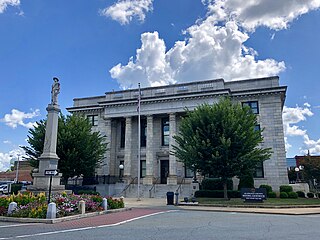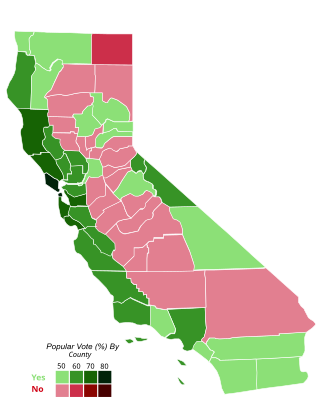A felony is traditionally considered a crime of high seriousness, whereas a misdemeanor is regarded as less serious. The term "felony" originated from English common law to describe an offense that resulted in the confiscation of a convicted person's land and goods, to which additional punishments including capital punishment could be added; other crimes were called misdemeanors. Following conviction of a felony in a court of law, a person may be described as a felon or a convicted felon.
A misdemeanor is any "lesser" criminal act in some common law legal systems. Misdemeanors are generally punished less severely than more serious felonies, but theoretically more so than administrative infractions and regulatory offences. Typically, misdemeanors are punished with prison time of no longer than one year, monetary fines, or community service.

Alamance County is a county in North Carolina. As of the 2020 census, the population was 171,415. Its county seat is Graham. Formed in 1849 from Orange County to the east, Alamance County has been the site of significant historical events, textile manufacturing, and agriculture.
Hugh B. Webster was an accountant, farmer, register of deeds, and North Carolina state senator from Caswell County, North Carolina. As a state senator, he represented North Carolina's 24th Senate district from 1995 to 2006, which included constituents in Alamance, Caswell, and parts of Person counties.
In the United States, habitual offender laws have been implemented since at least 1952, and are part of the United States Justice Department's Anti-Violence Strategy. These laws require a person who is convicted of an offense and who has one or two other previous serious convictions to serve a mandatory life sentence in prison, with or without parole depending on the jurisdiction. The purpose of the laws is to drastically increase the punishment of those who continue to commit offenses after being convicted of one or two serious crimes.
A hybrid offence, dual offence, Crown option offence, dual procedure offence, offence triable either way, or wobbler is one of the special class offences in the common law jurisdictions where the case may be prosecuted either summarily or on indictment. In the United States, an alternative misdemeanor/felony offense lists both county jail and state prison as possible punishment, for example, theft. Similarly, a wobblette is a crime that can be charged either as a misdemeanor or an infraction, for example, in California, violating COVID-19 safety precautions.

Pagan's Motorcycle Club, or simply the Pagans, is an outlaw motorcycle club formed by Lou Dobkin in 1957 in Prince George's County, Maryland, United States. The club rapidly expanded and by 1959, the Pagans, originally clad in blue denim jackets and riding Triumphs, began to evolve along the lines of the stereotypical one percenter motorcycle club.
A criminal defense lawyer is a lawyer specializing in the defense of individuals and companies charged with criminal activity. Some criminal defense lawyers are privately retained, while others are employed by the various jurisdictions with criminal courts for appointment to represent indigent persons; the latter are generally called public defenders. The terminology is imprecise because each jurisdiction may have different practices with various levels of input from country to country. Some jurisdictions use a rotating system of appointments, with judges appointing a private practice attorney or firm for each case.

The Times-News is an American, English language daily newspaper based in Burlington, North Carolina formed in 1931 by the merger of the Burlington Daily Times and The Burlington News.
In 2008, there were 415,810 crimes reported in the U.S. state of North Carolina, including 605 murders. In 2014, there were 318,464 crimes reported, including 510 murders.
Expungement in the United States is a process which varies across jurisdictions. Many states allow for criminal records to be sealed or expunged, although laws vary by state. Some states do not permit expungement, or allow expungement under very limited circumstances. In general, once sealed or expunged, all records of an arrest and of any subsequent court proceedings are removed from the public record, and the individual may legally deny or fail to acknowledge ever having been arrested for or charged with any crime which has been expunged.
The PayPal 14 are a group of defendants allegedly connected with the hacktivist group Anonymous, thirteen of whom pleaded guilty in a San Jose court in California, United States in December 2013, to charges of conspiring to disrupt access to the PayPal payment service. The attempted four-day disruption of PayPal's operations was allegedly in response to PayPal's refusal to process donations to Wau Holland Stiftung's PayPal account set up to collect funds for WikiLeaks, and was part of a wider Anonymous campaign, Operation Payback.

In the United States, a person may have their voting rights suspended or withdrawn due to the conviction of a criminal offense. The actual class of crimes that results in disenfranchisement vary between jurisdictions, but most commonly classed as felonies, or may be based on a certain period of incarceration or other penalty. In some jurisdictions disfranchisement is permanent, while in others suffrage is restored after a person has served a sentence, or completed parole or probation. Felony disenfranchisement is one among the collateral consequences of criminal conviction and the loss of rights due to conviction for criminal offense. In 2016, 6.1 million individuals were disenfranchised on account of a conviction, 2.47% of voting-age citizens. As of October 2020, it was estimated that 5.1 million voting-age US citizens were disenfranchised for the 2020 presidential election on account of a felony conviction, 1 in 44 citizens. As suffrage rights are generally bestowed by state law, state felony disenfranchisement laws also apply to elections to federal offices.

Proposition 47, also known by its ballot title Criminal Sentences. Misdemeanor Penalties. Initiative Statute, was a referendum passed by voters in the state of California on November 4, 2014. The measure was also referred to by its supporters as the Safe Neighborhoods and Schools Act. It recategorized some nonviolent offenses as misdemeanors, rather than felonies, as they had previously been categorized.
On August 12, 2017, DeAndre Harris, a Black man, was assaulted by six White men in an attack in a parking garage next to the police headquarters during the Unite the Right rally in Charlottesville, Virginia, United States. Images and video of the assault captured by photojournalist Zach Roberts went viral and became a symbol of the enmity underlying the protest.
As one of the fifty states of the United States, California follows common law criminal procedure. The principal source of law for California criminal procedure is the California Penal Code, Part 2, "Of Criminal Procedure."
Marina Medvin is an American criminal defense attorney located in Alexandria, Virginia.
The Federico murder case was a criminal case which took place in Chesterfield County, Virginia, United States, in which Josh Federico shot his wife, Sarah, killed her boyfriend Lawrence Howell, and attempted to kill her unborn child. Following his arrest, Federico conspired with family members and friends to hire someone to kill his father-in-law and brother-in-law. Five people have been implicated in these crimes.

Refugio Rodriguez is adjunct professor and a former member of the Los Angeles Unified School District Board of Education representing District 5 and former president of the board. He resigned from both positions on July 23, 2018, after an accounting scandal.





